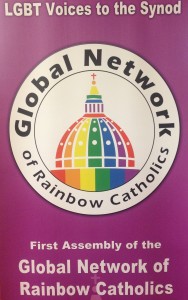 In a day an age when there are conflicting views on what human rights is, the way in which the faith community responds to these issues is critical. The reality of course is that the faith community is just that, a wide community of different faiths and within each of those faiths different expressions and understandings. For those not intimately involved it can seem a dangerous marsh of hidden quicksand, easily trapping you and drawing you under! What is however not disputable is that the vast majority of people around the world chose to identify themselves with one faith community or another.
In a day an age when there are conflicting views on what human rights is, the way in which the faith community responds to these issues is critical. The reality of course is that the faith community is just that, a wide community of different faiths and within each of those faiths different expressions and understandings. For those not intimately involved it can seem a dangerous marsh of hidden quicksand, easily trapping you and drawing you under! What is however not disputable is that the vast majority of people around the world chose to identify themselves with one faith community or another.
The big daddy of them all still remains the Roman Catholic Church. With roughly 1.25 Billion members it on its own accounts for 56% of all Christians in the world. So what the Roman Catholic Church says about issues of family and sexuality has a major impact on a very large proportion of the world’s population, and that influence reaches well beyond the membership of the Catholic Church.
Following on the back of two very conservative popes a new breeze seems to be blowing through the ancient corridors of the Vatican. Pope Francis has showed an openness to dialogue, and seems to more commonly apply the “law of love” rather than “love of the law”. About a year into his papacy he called the first Synod on the family. Taking place in Rome, for the first time topics which were considered closed we openly discussed. One was “how do you define a family?” and another was “what would a more pastoral approach to dealing with issues like divorce and homosexuality be?” Of course, one of the questions on the outside of the Synod remained “how appropriate is it for a group of elderly men sworn to celibacy to not only discuss but make decisions in this regard?”
While significant support for more open positions have been witnessed by bishops from some regions of the roman Catholic Church, there have also been many strongly conservative and fearful voices. It is with this background that a group of 80 Catholics from 30 different countries gathered together in Rome to establish a Global Network of Rainbow Catholics. In January 2014 there was a launch of GIN-SSOGIE (The Global Interfaith Network for people of all Sexes, Sexual Orientation, Gender Identity and Expression). During that meeting we had a very clear policy of anonymity for those who needed it; we acknowledged that in various places, if a person’s sexuality was identified their life and or livelihood would be in danger, so quite correctly we gave people the option to not have photos taken, not be quoted, not be mentioned etc.
Now in October of 2015 we launched GNRC (The Global Network of Rainbow Catholics). Yet again we needed to apply the options of anonymity. We had to acknowledge that in certain countries, in certain diocese, in certain places, if the church was to find out that a person (lay or clergy or religious) identifies as LGBT there job would be in danger, they could be excommunicated, their ministry to certain people would be TERMINATED. These realities were further borne out in the statement made from GNRC to the Synod on the Family: “Many in our Church, thought that they were serving God by hating us, and some still do, especially among the hierarchy…….. We want to set up our network in such a way that we can even be useful to you, though we know from long experience how frightened many of you are of communicating with us discreetly, even less talking to us on the record!”
SO, to ask the question again, should we care? The reality is that sentiments shared by various bishops within the Catholic church fairly reflect sentiments in many of the countries in which Church of Sweden supports development work, and more particularly in which we support work related to Sexual Reproductive Health and Rights (SRHR), gender as well as work relating to HIV. All of this work faces the significant challenges posed by some faith leaders and faith adherents of towing a very narrow line as to what can or cannot be discussed. This significantly impacts the vulnerabilities of people who are pushed to the margins when the services they need are provided in the center. Working with networks like GNRC and GIN-SSOGIE will continue to be crucial in helping to broaden perspectives on human dignity and human sexuality. We will continue to find ways of supporting and uplifting their voice, and as and where possible assist in brining dialogue between people of differing opinions to impact the common good of all people.
Lämna ett svar